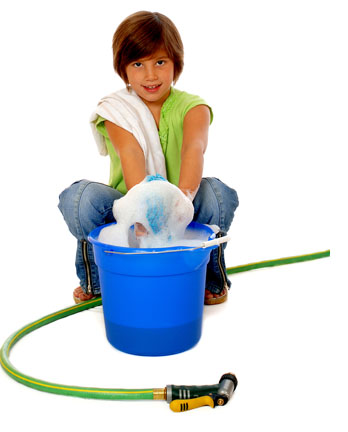
Want a Young Child to 'Help' or 'Be a Helper'? Choice of Words Matters
Tying helping to children's sense of identity may be key
April 30, 2014—How do you get a preschooler to help with chores and other household tasks? A new study suggests that adults' word choice can make a big difference.
The study, by researchers at the University of California, San Diego, the University of Washington, and Stanford University, appears in the journal Child Development.
The researchers carried out two experiments with about one hundred and fifty 3- to 6-year-olds from a variety of ethnic and racial backgrounds who came from middle- to upper-middle-class homes. In both experiments, an adult experimenter began by talking to children about helping. The only difference between the two studies was that in one, helping was referred to with a verb (e.g., "Some children choose to help"), while in the other, it was referred to with a noun (e.g., "Some children choose to be helpers"). Then the children began playing with toys. While they were playing, the adult provided four opportunities for the youngsters to stop and help the experimenter—to pick up a mess, open a container, put away toys, and pick up crayons that had spilled on the floor. In each case, the children had to stop playing to help.
The researchers also gathered baseline data, looking at to what extent a child chose to help the experimenter when helping was never mentioned.
Children who heard the noun wording (helper) helped significantly more than children who heard the verb wording (help). When the experimenter talked to youngsters about helping, using verb wording, the children didn't help any more than when the experimenter never brought up helping at all.
"These findings suggest that parents and teachers can encourage young children to be more helpful by using nouns like helper instead of verbs like helping when making a request of a child," says Christopher J. Bryan, assistant professor of psychology at the University of California, San Diego, who worked on the study. "Using the noun helper may send a signal that helping implies something positive about one's identity, which may in turn motivate children to help more."
ARTICLE:
"'Helping' Versus 'Being a Helper': Invoking the Self to Increase Helping in Young Children," Christopher J. Bryan, Allison Master, and Gregory M. Walton. Child Development (2014). Published online: 29 APR 2014. DOI: 10.1111/cdev.12244.
ABSTRACT:
"Can a subtle linguistic cue that invokes the self motivate children to help? In two experiments, 3- to 6-year-old children (N = 149) were exposed to the idea of “being a helper” (noun condition) or “helping” (verb condition). Noun wording fosters the perception that a behavior reflects an identity—the kind of person one is. Both when children interacted with an adult who referenced “being a helper” or “helping” () and with a new adult (), children in the noun condition helped significantly more across four tasks than children in the verb condition or a baseline control condition. The results demonstrate that children are motivated to pursue a positive identity. Moreover, this motivation can be leveraged to encourage prosocial behavior."
RELATED ARTICLE:
Core Competencies for Kids: Prosocial Skills
What makes the difference between kids who are at risk for lifelong mental-health and behavioral problems and those who seem able to deal with whatever life throws at them as they mature?
